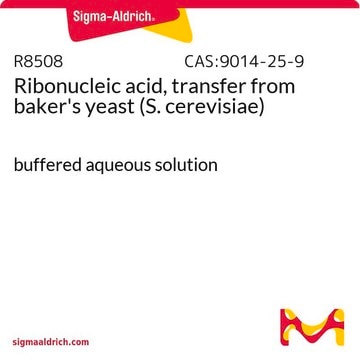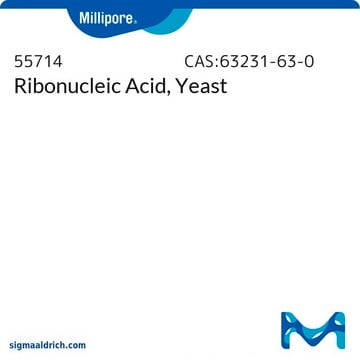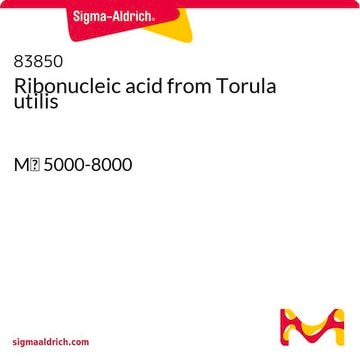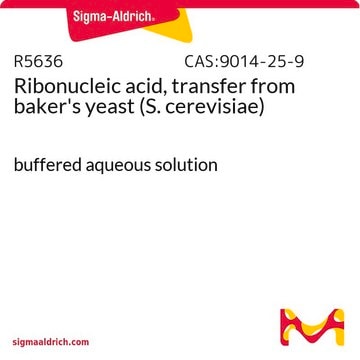R6875
Ribonucleic acid from torula yeast
core, Type II-C
Synonym(s):
RNA
Sign Into View Organizational & Contract Pricing
All Photos(1)
About This Item
Recommended Products
Looking for similar products? Visit Product Comparison Guide
Application
Ribonucleic acid (RNA) from torula yeast may be used as a substrate for studying ribonuclease activities of enzymes such as ribonuclease-A, ribonuclease T1 (RNAase) and bougainvillea xbuttiana antiviral protein 1 (BBAP1).
Storage Class Code
11 - Combustible Solids
WGK
WGK 3
Flash Point(F)
Not applicable
Flash Point(C)
Not applicable
Personal Protective Equipment
dust mask type N95 (US), Eyeshields, Gloves
Choose from one of the most recent versions:
Already Own This Product?
Find documentation for the products that you have recently purchased in the Document Library.
Customers Also Viewed
Ribonuclease, deoxyribonuclease, and antiviral activity of Escherichia coli-expressed Bougainvillea xbuttiana antiviral protein 1.
Choudhary NL, Yadav OP, Lodha ML.
Biochemistry. Biokhimiia, 73, 173-177 (2008)
J Steyaert et al.
Biochemistry, 30(35), 8661-8665 (1991-09-03)
We report on the effect of the viscogenic agents glycerol and ficoll on the RNase T1 catalyzed turnover of GpA, GpC, GpU, and Torula yeast RNA. For wild-type enzyme, we find that the kcat/Km values for the transesterification of GpC
Toru Miyamoto et al.
Biotechnology progress, 25(6), 1678-1685 (2009-09-03)
Ribonuclease (RNase), which often represents molecular biological contamination, is a thermostable enzyme. When RNase is heated at 121 degrees C by autoclave sterilization for 20 min, it does not lose its activity. However, the nature of the molecular events by
H Yanagawa et al.
Nucleic acids symposium series, 25(25), 113-114 (1991-01-01)
Three nucleosides catalyzing the oxidoreduction of NADH and K3Fe(CN)6 were isolated from Torula yeast RNA and also obtained by a series of steps: SDS-phenol extraction, nuclease P1 digestion, alkaline phosphatase digestion, anion exchange chromatography, and HPLC on an ODS column.
Maria D Paraskevopoulou et al.
Nucleic acids research, 41(Web Server issue), W582-W586 (2013-05-30)
BiDaS is a web-application that can generate massive Monte Carlo simulated sequence or numerical feature data sets (e.g. dinucleotide content, composition, transition, distribution properties) based on small user-provided data sets. BiDaS server enables users to analyze their data and generate
Our team of scientists has experience in all areas of research including Life Science, Material Science, Chemical Synthesis, Chromatography, Analytical and many others.
Contact Technical Service











